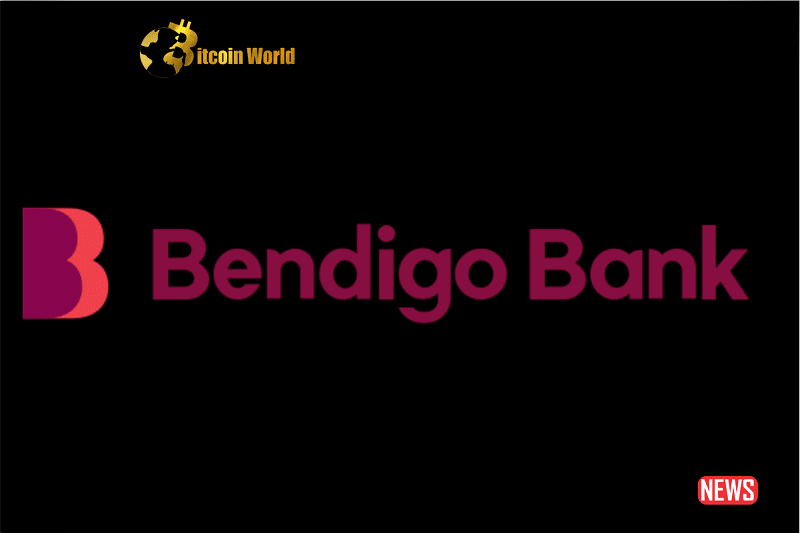Heads up, crypto enthusiasts in Australia! Bendigo Bank, a major financial player down under with a whopping 2.3 million customers, has just made a significant move that’s got the crypto world buzzing. Following in the footsteps of Commonwealth Bank, NAB, and Westpac, Bendigo Bank is now putting the brakes on what they’re calling “high-risk crypto payments.” Let’s dive into what this means for you and the future of crypto in Australia.
Why the Sudden Stop? Protecting You from Scams
The driving force behind this decision is all about protecting you, the customer, from falling victim to those nasty investment scams that are unfortunately becoming more and more common. Jason Gordon, Bendigo Bank’s head of fraud, put it plainly: they’re introducing “some friction to certain genuine payments” to tackle fraudulent transactions. Think of it like adding an extra layer of security to your online shopping – a bit inconvenient sometimes, but ultimately there to keep your money safe.
Behind the Scenes: How Does Bendigo Bank Identify High-Risk Payments?
Now, you might be wondering, what exactly constitutes a “high-risk” crypto payment? Bendigo Bank is keeping their cards close to their chest on the specifics. They’ve confirmed they use “a combination of factors” but aren’t spilling the beans on the exact criteria. Similarly, they haven’t disclosed which crypto exchanges might be affected by these new rules. This lack of transparency leaves a bit of mystery in the air.
The Ripple Effect: What Are the Potential Consequences?
This move isn’t without its potential downsides. Chengyi Ong, the APAC Policy Head at Chainalysis, raises a valid point: could this push Aussie crypto users towards offshore exchanges? While blocking certain transactions might hinder some criminal activity, it could also create uncertainty and potentially drive users to platforms outside the reach of Australian authorities. It’s a bit of a double-edged sword.
Expert Opinions: A Call for Collaboration and Caution
The crypto community and financial experts have weighed in on Bendigo Bank’s decision, highlighting the complexities of the situation:
- Chengyi Ong (Chainalysis): Emphasizes the need for a team effort to combat scams. He suggests a collaborative approach involving banks, regulators, telcos, and social media platforms to target scams at all points of contact.
- Dr. Aaron Lane (RMIT Blockchain Innovation Hub): Stresses the importance of banks working *with* crypto exchanges to boost consumer protection. He argues that “debanking” – essentially cutting off access to banking services – should be a last resort for severe cases, not a blanket approach to the entire crypto industry.
Australia’s Crypto Regulation: Stuck in the ‘Too-Hard Basket’?
Here’s the bigger picture: Australia has been mulling over specific crypto regulations for over three years. Dr. Lane’s call to action – urging lawmakers to prioritize crypto law reform and take it “out of the too-hard basket” – resonates with many in the industry. The Department of the Treasury echoed this sentiment in June, warning about the risks of inaction, including stifling innovation and potentially pushing businesses underground.
Key Takeaways: What Does This Mean for You?
So, what are the key things to remember about Bendigo Bank’s decision?
- Increased Security: Bendigo Bank is aiming to protect its customers from investment scams by blocking certain crypto payments.
- Potential Inconvenience: Legitimate crypto transactions might experience some delays or friction.
- Uncertainty for Exchanges: The specific crypto exchanges affected by this move remain undisclosed.
- Push to Offshore Platforms?: Experts worry this could drive users to less regulated international exchanges.
- Call for Collaboration: There’s a growing consensus on the need for banks, regulators, and the crypto industry to work together.
- Urgency for Regulation: The move highlights the ongoing need for clear and effective crypto regulations in Australia.
Looking Ahead: Navigating the Crypto Landscape
Bendigo Bank’s decision is a clear indicator of the challenges in balancing innovation with consumer protection in the rapidly evolving world of cryptocurrency. As Australia continues to grapple with crypto regulation, the emphasis remains on finding a collaborative approach that safeguards consumers without stifling the potential of this emerging technology.
What are your thoughts on Bendigo Bank’s move? Is it a necessary step to protect consumers, or does it risk hindering the growth of the crypto industry in Australia? The conversation is just getting started.
Disclaimer: The information provided is not trading advice, Bitcoinworld.co.in holds no liability for any investments made based on the information provided on this page. We strongly recommend independent research and/or consultation with a qualified professional before making any investment decisions.


